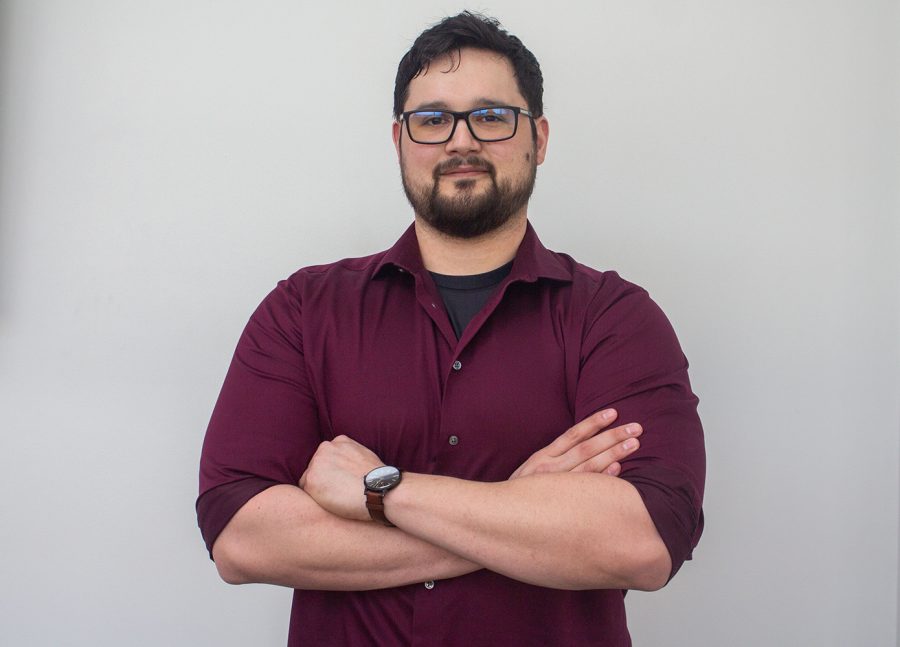New student organization aims to make STEM more inclusive to students of Hispanic, Native American descent
The Society for the Advancement of Chicanos/Hispanics and Native Americans in Science is coming to campus, aiming to make STEM more inclusive for students who are part of marginalized communities.
University of Iowa graduate research assistant of molecular medicine with a masters in biology, Cody Poe, poses for a portrait in the Pappajohn Biomedical Discovery Building on Feb. 22. As a member of SACNAS, Poe said, “Any group that tries to increase diversity is beneficial to science and higher education.” (Ayrton Breckenridge/The Daily Iowan)
February 22, 2021
A new student organization at the University of Iowa is trying to make STEM programs more inclusive and welcoming to students of Hispanic and Native American descent.
The Society for Advancement of Chicanos/Hispanics and Native Americans in Science wants to help diversify the different STEM programs at the UI. The program is geared toward building a community where underrepresented students in STEM can feel welcome and accepted.
Both undergraduate and postgraduate students who identify as Hispanic or Native American will be able to join and use the resources the club has to offer, including providing students with mentorship and career advice.
UI Associate Professor of Environmental Science Bradley Cramer, the provost’s faculty fellow for diversity, equity, and inclusion, said when it comes to representation, STEM fields have room for improvement.
“One of the biggest challenges is lack of representation as teachers in the classroom,” Cramer said. “Being able to find a way to help build a sense of belonging and a sense of community is a wonderfully important opportunity.”
Cramer added that this representation problem is not just at the UI, but within STEM programs all across the country.
RELATED: University of Iowa College of Engineering receives diversity recognition, but still has work to do
“This is not unique to Iowa. This is a STEM problem nationwide,” Cramer said. “STEM disciplines tend to have the lowest diversity of both faculty and students.”
Programs like the Society for Advancement of Chicanos/Hispanics and Native Americans in Science are attempting to make STEM a place where people of marginalized communities can feel at home, and comfortable, Cramer said.
UI senior Madison Anae, who is studying geoscience, said she believes that representation gives hope to students of marginalized communities that they can be accepted and welcomed.
“To me, it means hope for the future of STEM,” Anae said. “To make it more inclusive, to make academia a better place for people of color and other marginalized identities as well.”
Cramer said Hispanics and Native American students are very underrepresented in student bodies across the country, particularly in STEM programs. At the UI, Hispanic people make up 7.4 percent of the student body overall, while Native Americans make up 0.2 percent.
Anae said promoting diversity is not only beneficial for representation on campus, but could also be beneficial in the work that STEM programs do.
“Diversity has actually been shown in a lot of studies to generate more creative thinking. So, as we diversify STEM, that creativity is important,” Anae said. “That creativity is what generates those great ideas that we have that can solve enormous problems.”
The Society for Advancement of Chicanos/Hispanics and Native Americans in Science has been working on the national level to promote the inclusion of Hispanics and Native Americans into STEM programs, with 118 chapters nationwide.
To UI second-year graduate student Cody Poe, who is studying biomedical science, the organization means that marginalized voices will finally be heard in a field where they have been shut out for years.
“I’ve seen from my friends on Facebook things like ‘Only white people can do science.’ Well, that’s not true,” Poe said. “It’s an uphill battle for sure, but we can keep our voices heard and keep pushing, it can be good overall.”



